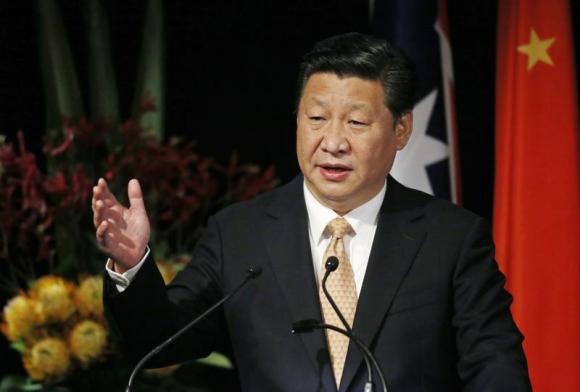Shortly after becoming General Secretary of the CCP in late 2012, Xi Jinping began promoting the “Chinese Dream,” a vaguely defined slogan to represent his leadership aspirations and the political ideology of his administration. Xi Jinping has now unveiled a list to be added to the cache of numbered catchphrases used by Party leaders to denote their political philosophies: the “Four Comprehensives.” The Global Times reports:
A moderately prosperous society, reform, rule of law, Party discipline — these “Four Comprehensives” are Xi Jinping‘s blueprint for China’s future.
[…] “A moderately prosperous society” is not only the primary objective identified at the 18th Party Congress, but also “a crucial step towards the Chinese dream of great rejuvenation.”
[…] “Deepening reform” identifies the route to prosperity and social progress.
[…] “The rule of law” came to prominence at the fourth session of the 18th CPC Central Committee, and guarantees modernization of the system of government while championing social justice.
The leadership has taken great pains to address corruption, which they believe may threaten the very survival of the Party and the state: “Strengthening Party discipline” is a must for the CPC to survive. [Source]
For more on Xi’s ongoing crackdown on Party corruption, see prior coverage via CDT. The Wall Street Journal’s Josh Chin situates Xi’s seemingly nebulous “Four Comprehensives” into the historical context of CCP political slogans:
In the past, Chinese leaders have tended to fall into two camps when expounding their theories of development: those who favor numbered lists, and those who opt for more conventional proclamations. Late Premier Zhou Enlai and former President Jiang Zemin were in the former camp, pushing the “Four Modernizations” and “Three Represents,” respectively. Meanwhile, Deng Xiaoping (“Reform and Opening Up”) and former President Hu Jintao (“Scientific Outlook on Development”) opted to eschew the integers.
Aside from the idea of a moderately prosperous society — a Confucian ideal revived and popularized under Mr. Hu — the other catch-phrases are all closely associated with Mr. Xi, who has cracked down hard on corruption in Communist Party ranks while pushing for legal reforms and warning of the need to be resolute about reforms in general.
[…] The Four Comprehensives, though vague, are lucid by the standards of numbered Chinese political slogans. The Three Represents, for example, calls for the Communist Party represent “the requirements for developing China’s advanced social productive forces, the orientation China’s advanced culture and the fundamental interests of the overwhelming majority of the Chinese people.”
[…] It’s not clear what, if any, impact Mr. Xi’s new theory will have on actual policy. What is clear, with China’s annual legislative meetings set to convene soon in Beijing, is that officials throughout the country will be rushing to study it comprehensively. [Source]
Also at the Wall Street Journal, William Kazer looks at other newly-coined but unnumbered slogans currently circulating China’s leadership:
China may have lost some of its manufacturing edge, but it’s still able to produce the stuff that counts. When it comes to the production of impressive political jargon and clichés, it hasn’t lost its touch.
Take the handiwork of the Communist Party’s wordsmiths who have come up with the “new normal” (新常态) as a nifty way to describe China’s slower economic growth – without actually having to say just that. It emphasizes how everything is normal – no need to be alarmed — even if there is a bit less money sloshing around. Eventually, there will be better-quality growth, too – though don’t ask when.
Slogans – unlike China’s economy – don’t suffer from overcapacity problems. There is always a market for more of them. [Source]
Shortly after Xi took the Party helms, his administration laid out “Eight Musts” to guide Party conduct. For a comprehensive list of major numbered policy slogans dating back to the Mao days, see “The Long History of China’s Obsession With Numbered Policies,” from Nikhil Sonnad at Quartz.







